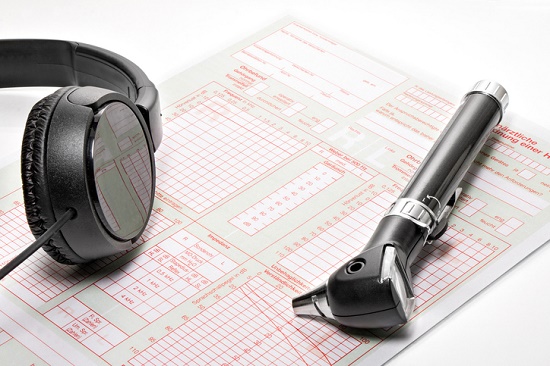
The hearing test truly is the easy part. The tricky part is acknowledging your hearing loss and actually scheduling the hearing test in the first place.
You have more than likely heard the stats by now: 48 million people in the United States have hearing loss but only a minor fraction actually do something about it, and only 20 percent of those who could reap benefits from hearing aids actually make use of them.
So if you’ve already arranged your hearing test, great job, you’ve already conquered the strongest hurdle to healthier hearing.
The hearing exam, as you’ll notice, is an easy, non-invasive procedure that will establish the severity of your hearing loss to help develop the best suited course of treatment.
Shortly after you initially arrive at the office, you’ll start by filling out some paperwork. Then, you’ll meet with your hearing care provider to go over your hearing health history.
Your Hearing Health History
Your hearing loss, if existing, can be due to direct exposure to loud sound, the natural aging process, or by an underlying ailment. You’ll want to rule out any underlying conditions prior to proceeding to the actual hearing test.
If you have an earwax impaction, as an example, you could be hearing better within a few minutes shortly after a professional cleaning. The presence of any other conditions will be examined and the applicable referral made, if required.
After going over your general medical history, you’ll go over your exposure to loud sounds, your hearing loss symptoms, and exactly what you wish to accomplish with better hearing.
It’s crucial to establish potential causes, how symptoms are negatively affecting your life, and how better hearing will improve your life, which is after all the entire point. Be suspicious of the practitioner that doesn’t appear to care about the main reasons why you desire to improve your hearing to begin with.
Testing Your Hearing
There’s one more step before starting the hearing test: the visual examination of the ear with an instrument known as an otoscope. This will help rule out any issues with the ear canal, the eardrum, or the abnormal buildup of earwax.
Next, you’ll be accompanied to a sound-treated room with your hearing care provider. You’ll be asked to wear headphones, and the specialist will begin to play you some sounds.
You’ll be presented with different sounds at assorted frequencies, and you’ll be asked to identify the quietest sounds you can hear at each pitch. This is called your hearing threshold, and the hearing care professional will log these values on a graph known as an audiogram.
The hearing test will probably also entail speech testing, where you’ll be instructed to repeat the words delivered to you. Various types of words, presented at different volumes with and without background noise, will be introduced. This will help establish if hearing aids can help you with speech understanding.
When the hearing test is finished, your hearing care provider will review the final results with you.
Assessing Your Hearing Test Results
Referencing your audiogram, your hearing care provider will now talk about your hearing in both ears. Depending on the results, your hearing will be characterized as normal or as exhibiting mild, moderate, severe, or profound hearing loss.
If a hearing loss is found, the next step is going over your treatment options. Given that there are no current medical or surgical treatments to restore hearing damage, this means comparing your hearing aid options.
Contemporary hearing aids come in an assortment of shapes, sizes, and colors, at different price points with a number of advanced features. In selecting your hearing aids, it’s important to work with a qualified hearing care professional for three main reasons:
- They can help you find the best hearing aid model to satisfy all of your objectives.
- They can help you determine the advanced features you need—along with the ones you don’t—at a price that suits your budget.
- They can program your new hearing aids to enhance only the sounds you have trouble hearing—identified by the hearing test—ensuring optimal sound quality.
And that’s it, a quick, easy procedure in exchange for a lifetime of healthier hearing. We’d say that’s a very good deal.
We look forward to seeing you!
